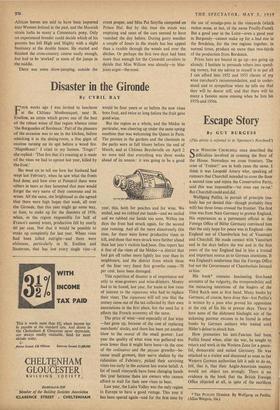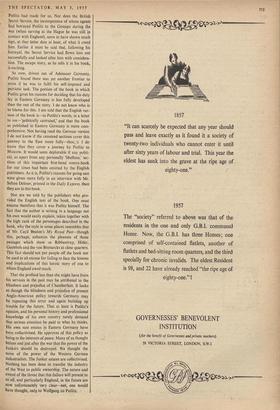Escape Story
By GUY BURGESS
(This article is referred to in 'Spectator's Notebook')
SIR WtNgroN CHURCHILL once described the difficulties involved in crossing the floor of the House. Nowadays we cross frontiers. The cries of 'Traitor!' are in both cases the same. I think it was Leopold Amery who, speaking of rumours that Churchill intended to cross the floor a second time and rejoin the Conservative Party, said this was impossible—`no man can re-rat.' But Churchill could and did.
Wolfgang Putlitz, in pursuit of principle (no- body has yet denied this—though probably they will) has three times crossed the frontier. The first time was from Nazi Germany to prewar England. His experiences as a permanent official in the Foreign Office of Hitler Germany convinced him that the only hope for peace was in England—the England not of Chamberlain but of Vansittart and Churchill. He made contact with Vansittart and in the days before the war and in the first years of the war England had in him a trusted and important source as to German intentions. It was England's misfortune that the Foreign Office but not the Government of Chamberlain listened to him.
His book* contains fascinating first-hand accounts of the vulgarity, the irresponsibility and the menacing intentions of the leaders of the Third Reich seen at first hand. Many books by Germans, of course, have done this—but Putlitz's is written by a man who proved his opposition at the risk of his life in prewar days. There is here none of the dishonest hindsight nor of the sickening postwar excuses to be found in other books by German authors who waited until Hitler's defeat to attack him.
How premature his anti-Fascism had been Putlitz found when, after the war, he sought to return and work in the Western Zone for a peace-, ful, democratic and united Germany. He was, attacked as a traitor and dismissed as soon as the Western German authorities felt it safe to do so, felt, that is, that their Anglo-American masters would not object too strongly. There is no evidence in the book that the British Foreign Office objected at all, in spite of the sacrifices * THE PUTLITZ DOSSIER. By Wolfgang zu Putlitz. (Allan Wingate, 16s.) Putlitz had made for us. Nor does the British Secret Service, the incompetence of whose agents had betrayed Putlitz to the Gestapo during the war (when serving at the Hague he was still in contact with England), seem to have shown much sign, at that latter date at least, of what it owed him. Earlier it must be said that, following his betrayal, the Secret Service had flown him out successfully and looked after him with considera- tion. The escape story, as he tells it in his book, is exciting.
So now, driven out of Adenauer Germany, Putlitz found there was yet another frontier to cress if he was to fulfil his self-imposed and patriotic task. The portion of the book in which Putlitz gives his reasons for deciding that his duty lay in Eastern Germany is less fully developed than the rest of the story. I do not know who is to blame for this. I am told that the English ver- sion of the book is—in Putlitz's words, in a letter to me—`politically castrated,' and that the book as published in Eastern Germany is more com- prehensive. Not having read the German version I do not know if the censored sections cover this journey to the East more fully—thouji I do know that they cover a journey by Putlitz to Moscow. It would seem deplorable if any politi- cal, as apart from any personally 'libellous,' sec- tions of this important first-hand source-book for our times had been omitted by the English publishers. As it is, Putlitz's reasons for going east were given more fully in an interview with Mr. Sefton Delmer, printed in the Daily Express, than they are in this book.
Nor are we told by the publishers who pro- vided the English text of the book. One must assume therefore that it was Putlitz himself. The fact that the author is writing in a language not his own would easily explain, taken together with the high rank of the personages described in the book, why the style in some places resembles that of Mr. Cecil Beaton's My Royal Past—though this, perhaps, enhances the pleasure of those passages which show us Ribbentrop, Hitler, Goebbels and the von Bismarcks at close quarters. This fact should not put people off the book nor be used as ah excuse for failing to face the lessons and implications of this heroic story of one to whom England owed much.
That she profited less than she might have from his services in the past may be attributed to the blindness and prejudice of Chamberlain. It looks as though the blindness and prejudice of present Anglo-American policy towards Germany may be repeating this error and again building up trouble for the future. That at least is Putlitz's opinion, and his personal history and professional knowledge of his own country surely demand that serious attention be paid to what he thinks. His own vast estates in Eastern Germany have been collectivised. He approves of this policy as being in the interests of peace. Many of us thought before and just after the war that the power of the Junkers should be destroyed. We thought the same of the power of the Western German industrialists. The Junker estates are collectivised. Nothing has been done to transfer the industry of the West to public ownership. The nature and extent of the threat that this failure will present to us all, and particularly England, in the future are now unfortunately very clear—not, one would have thought, only to Wolfgang zu Putlitz.











































 Previous page
Previous page